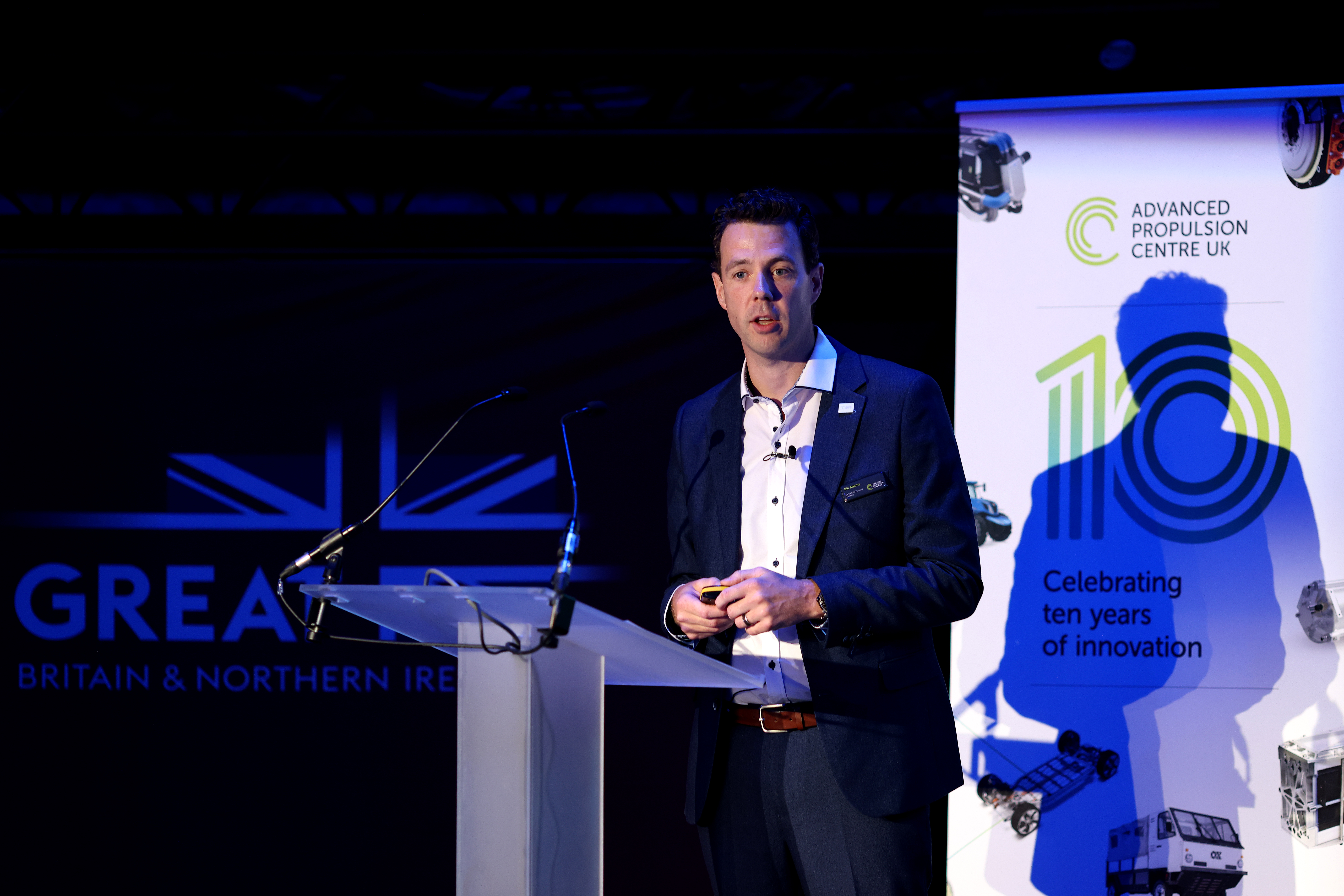A decade of innovation

Rik Adams, Innovation Delivery Director, Advanced Propulsion Centre – speaking at the Cenex-Low Carbon Vehicle Show & Cenex-Connected Automated Mobility 2023.
The Advanced Propulsion Centre (APC) turns 10 this year, and as with all proper 10th birthday parties, we had cake. The icing on the cake I will come back to later, let’s first; reflect on the last decade, look at prescient challenges for our industry, and consider the future of the APC.
From modest beginnings
Back in 2013, when the APC was created, the low-carbon, net-zero automotive sector was relatively tiny, around 3,000 electric vehicles had been sold to date in the UK, the McLaren P1 was launched with an ‘incredible’ 4.7kWh battery, and a Renault Zoe was set to cost just £13,000. Much has changed in the wider industry since then, and perhaps too has the understanding of the significance of the APC. In 2013, expectations were, on reflection, pessimistic about what the APC, alongside Innovate UK and the UK Government could achieve.
The reality is that we’ve more high value projects than we ever expected too. We’ve created or safeguarded more jobs (55,000), supported projects expected to remove 350 million tonnes of CO2, far more than anticipated, together with 1.4 billion pounds of both industry and government investment; much of which has come from abroad as a result of the unique ecosystem created in the UK.
In addition to the headline statistics, we’re proud to have created and nurtured fantastic innovation and investment in the start-up and SME communities, through well considered products, like our Technology Developer Accelerator Programme, which seed great projects.
Innovate UK and our excellent research institutions and universities do amazing work at the earliest stages of development, and we build on this by operating at the latter stages of the innovation journey, as to truly realise the benefits, and for the emission reductions to become real, it’s essential for UK companies to produce UK products, which are used domestically and globally.
So, looking forward, where do I see our industry’s challenges?
The universal goal is to limit global temperature rise, and we all have unique parts to play in achieving this. We cannot lose sight of why we are doing it in the first place.
Towards this aim, the UK has net zero enshrined in law to end its contribution to global warming by 2050, but we all have a responsibility to deliver that goal as soon as possible.
There is no doubt the transition to net zero is happening, however, it’s still early days, and while incentives are pushing fleet customers towards BEVs (Battery Electric Vehicles), individual consumers still aren’t yet there at scale, only 7% of vehicles sales were EVs (Electric Vehicles) from the forecourt last year.
Affordability is key, but we also need products that can compete with their ICE (Internal Combustion Engine) counterparts, and we need to provide the end-to-end, joined-up value which convinces consumers (personal and business alike) to put UK zero-carbon tailpipe emission vehicles on UK roads to really scale up their benefits.
This foundation of better, more affordable, more connected, sustainably produced products is not simple. Systematic change is required in infrastructure, supply chains, jobs, education, digitalisation, innovation, and culture. It would be hard in isolation, but when the global landscape is so competitive, it is tough for the UK to find its way.
Yes, we have incredible institutions in this country – amazing technology companies, top universities, growing prioritisation of STEM (Science, Tech, Engineering and Maths) and STEAM (Science, Technology, Engineering, Arts and Maths) careers for our diverse society, but to accelerate onto the next stage of sustainable growth, we need to start to think differently in the next ten years.
Evolution not revolution
I’ve heard a great analogy for the approach we should take. That is, nature shows us that diversity is the key to survival. Thriving ecosystems are made up of interconnected networks and relationships, where there is no monoculture, no one best animal or one best plant. Evolution creates a plurality of solutions to the same problems faced in our habitats.
The same is true of solving our net-zero -emissions challenge, we need a breadth of solutions. Including batteries, hydrogen, eFuels, autonomy, different electric motors, power electronics and so on. To get to where we are today has been a revolution in automotive, and each of these could be another revolution all on their own, requiring us to leverage all aspects of our industry, and also very likely, cross-sector expertise to deliver.
The UK has so much diverse innovation in all these areas, but where we need to work cohesively, is on the commercialisation of the technology, supporting UK innovators to become successful businesses.
The icing
This requires investment, of course it does, but it needs to be done in a way which crowds in private finance, at the right times, with the right conditions to allow businesses to scale and achieve the next phase.
It also requires industry, government, and academia to work in harmony together to solve the consumers’ problems, and the business challenges to maximise the opportunity. This becomes the promised icing on the cake.
And this is the future for the APC, building on our 10 years of experience, to deliver the next 10 years of innovation.
Our product offerings might look a little different, but the core values will remain the same, using our added-value knowledge, skills, and expertise to bring together the best in the industry and academia to solve the pertinent challenges they face, with the support of Government and industry grants, because money alone won’t create the next set of revolutions. It’s money, plus support, mentoring and coaching, delivered by all stakeholders together, which will see us scale to achieve the UK’s net-zero ambitions, and I’m really excited about the role the APC will have in this.
